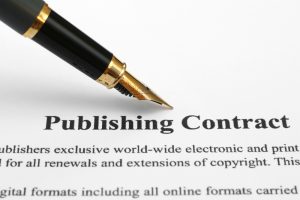Book Publishing 101: Contracts, Advances, and Royalties
 If you keep up with our blog, you’ll know we’ve mentioned contracts, advances, royalties several times. If you don’t know much about the book publishing world, chances are you aren’t familiar with these terms. Even though with DiggyPOD you’ll never sign a contract and you’ll always keep 100% of your profits, we still believe it’s important for you to know everything you possibly can about how traditional book publishing works and how it differs from self-publishing. That’s why we take it upon ourselves to educate you. We may be a little biased, but we believe that self-publishing allows for more freedom and autonomy. In order to make the best possible decision for your book, you need to as informed as possible.
If you keep up with our blog, you’ll know we’ve mentioned contracts, advances, royalties several times. If you don’t know much about the book publishing world, chances are you aren’t familiar with these terms. Even though with DiggyPOD you’ll never sign a contract and you’ll always keep 100% of your profits, we still believe it’s important for you to know everything you possibly can about how traditional book publishing works and how it differs from self-publishing. That’s why we take it upon ourselves to educate you. We may be a little biased, but we believe that self-publishing allows for more freedom and autonomy. In order to make the best possible decision for your book, you need to as informed as possible.
What is a book publishing contract?
A contract includes information specific to each publishing deal about author rights, royalties, advances, copyright, and more. Like any contract, the author will want to be sure they read their publishing contract as closely as possible to make sure they fully understand what it’s saying. Contracts will often include product descriptions—what the book is about. This part of the contract is important because the author will want to make sure it accurately reflects the manuscript in order to ensure a smooth editing process.
The contract will also discuss rights, subsidiary rights, and copyright. Rights include the right to print the book, in hardback and paperback versions, as well as audiobook and ebook rights. Subsidiary rights are concerned with other formats the book could be published in—translations, serials, and book club editions.
Another detail in the contact will cover whatever advance the publishing house is paying the author and what percentage of royalties the author will receive.
What is an advance?
Not all authors receive an advance from the company. For those who do, however, an advance is when a publishing company will pay a certain amount of money to be able to acquire the book. Think of it as a signing bonus. Advances range in amount, depending on the popularity of the author and how badly the company wants publishing rights. New authors typically get smaller advances, unless the book is so widely desired by multiple houses. For example, first-time author Emma Cline, who wrote The Girls, sold her book for $2 million to Penguin Random House.
Getting a large advance can be exciting, however, the author won’t start receiving royalties until their book sales match their advance. For example, if an author receives a $10,000 advance, they won’t start receiving money from their book sales until the book has sold over $10,000.
What are royalties?
Once the advance is met, the author will begin to receive royalties on their book. The percentage of royalties the author is paid will be detailed in the contract. Again, the amount of royalties received will be based on author popularity and perceived success of the book. The percentage authors receive typically varies from 10-15% of the sales price. That means if the book is being sold for $24.99, for every book sold, the author will receive $2.49-$3.75. Once the book sales break a certain number, an author’s royalty rate may go up.
Of course, contracts, advances, and royalties will vary depending on the size of the publisher. Even getting to the point where the company offers a contract can be long, difficult, and tiresome. When self-publishing, you remain in total control throughout the entire process. Because there’s no contract, you retain the ownership rights, not the publishing house. From publication to sales, as the author, you make the calls, and you reap the rewards. Don’t get bogged down in the legalities of contracts: do yourself and your book a favor and choose to self-publish.
